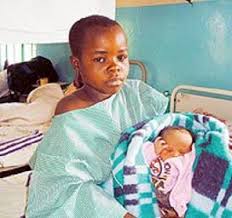
Mother – Ten year old holds her baby weighing 2kg. PHOTO: File
By Benard Mulwa
By Benard Mulwa
Concrete discussions on combating the triple threats among the teenage are at an advanced stage in Nairobi spearheaded by Center for reproduction rights, the reproductive health network Kenya, the Ministry of Health, and the Ministry of education
Key among the topics is to address the intertwined challenges of new HIV infections, adolescent pregnancies and sexual and gender-based violence among young people, which are significant barriers to Kenya’s progress towards the United Nations’ sustainable development goals.
Sexual and reproductive health and rights (SRHR) are fundamental components of the response to address the triple threat. They encompass a range of issues including family planning, maternal health, access to safe abortion and prevention of sexually transmitted infections.
The Ministry of Health has put in place interventions that will go a long way to reduce maternal paternal and antenatal motility and motilities in Kenya. According to medical experts, in 2023 Kenya is at 14 percent and most of the female of reproductive age 15 to 29 years are not able to access family planning.
The Ministry of Health has come up with new markets products in reaching 18 and above adolescents so that they can address their family planning and reduction of new HIV infection and prevention mother to child infections.
The Ministry of health has also enhanced youth private services to improve health outcomes, from level 3 to level 6 of all health facilities and has improved from 12 to 16 percent which is a huge milestone.
Another strategy that the ministry is working to address these challenges is the development of a comprehensive PCC strategy targeting the youths and has also developed the parent and caregiver guide strategy in 2022.
Mental health, drugs and substances is also a major driver to triple threat affecting the young people which the division is addressing.
Promotion of gender equity in relation to elimination of female genital mutilation and gender based violence, where the ministry has established a gender desk at the police stations in efforts to mitigate issues of GBV.
The ministry has also been able to capacity build health care providers to help the youths in matters of reproductive health and relations.
The ministry of health is also making final touches on the Sexual and reproductive health and rights (SRHR) policy, family planning, and at what age should teenage access family planning has been a contentious issue bided by children’s ACT.
Center for reproduction rights and the reproductive health network Kenya, has been able to do Segregation of age for teenage with pregnancy, between 10 to 14 years, 15 to 17 and 18 to 19 which will help in addressing the missing link and to identify what age group is weak so that to put in more innervations.
According to latest reports from Kenya Aids strategic framework on HIV prevalence is 3.2 percent in 2023 in Nairobi and the objective of the framework is to reduce new infections by 75 percent, Kenya is at 72 percent as of 2022.

More Stories
PARENTS URGED TO CHAMPION NATIONAL VALUES AS KENYA LAUNCHES YOUTH TRAINING MANUAL
Naivas, Uber Eats team up to boost online shopping and convenience retail in Kenya
MP Mary Otucho Advocates for Jobs and Flood Relief in Teso South